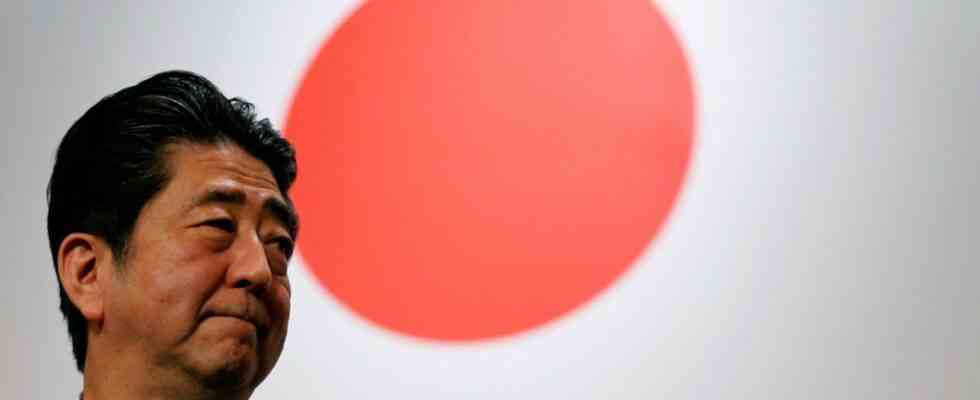Japan’s former Prime Minister Shinzo Abe has been assassinated. The attack happened on Friday around half past eleven noon local time in the city of Nara in southern Honshu. Abe had given a campaign speech for the right-wing conservative ruling party LDP for the upper house elections on Sunday at the Yamato-Saidaiji train station. Two shots were fired, at least one hit Abe from behind at close range. The fire department initially said they had revived him and taken him to the hospital by helicopter. In the early evening, the LDP reported that Shinzo Abe had succumbed to his injuries.
The suspected shooter is a 41-year-old resident of Nara. Security forces overpowered him after the fact. The murder weapon is said to have been a rifle with the barrel wrapped in duct tape.
Prime Minister Fumio Kishida, who was in Yamagata, returned to Tokyo immediately. A task force was set up. Cabinet Secretary Hirokazu Matsuno said in a first statement: “Whatever the reason, barbaric acts like these are unacceptable and we condemn them in the strongest possible terms.” Japan’s Foreign Minister Yoshimasa Hayashi, currently at the G-20 foreign ministers’ meeting in Indonesia, addressed the “concerns of foreign ministers from other countries”. US Secretary of State Tony Blinken expressed his condolences.
Abe had brought his party back to power
Shinzo Abe, 67, was one of the most influential post-war Japanese politicians. He was prime minister from 2012 to 2020, longer than anyone before him. He was also Prime Minister from September 2006 to September 2007, but his importance has to do mainly with his second term. At the time, Abe led the LDP out of its greatest crisis. As a result of various scandals and the Lehman shock, the power party lost its majority in parliament in 2009 for the first time in its history to a competitor, the centrist DPJ. Abe reinvigorated her as chairman and brought her back to power from opposition.
He managed to do this with a clear nationalist course and a policy that tended not to deal with social issues. His so-called Abenomics strategy combined loose monetary policy with consistent economic promotion and brought the island state gentle growth during the years of the global economic boom.
Under Abe, Japan seemed more confident and cosmopolitan than ever. However, also less self-critical when it came to Japan’s poorly processed history as an aggressor and partner of Hitler’s Germany in World War II. Abe was mostly interested in other countries when he wanted something from them. For example, he wanted the 2020 Olympic Games to be held in Tokyo because he expected it to give his country a boost; Of course, he could not foresee that they were ultimately postponed by a year due to the pandemic and that they also had to take place without foreign tourists and live viewers due to the fear of corona.
Abe was always in close contact with Russian President Vladimir Putin because he hoped to get back the so-called Northern Territories, the southern islands of the Kuril Islands off Hokkaido, which Russia has occupied since World War II. In the summer of 2020, Shinzo Abe resigned, officially because of the chronic intestinal inflammation that forced him to retire in 2007. At that time he looked back on his work and was quite self-critical. What he regretted most, however, was that as prime minister he had not managed to change the pacifist Article 9 of the constitution in favor of a more defensive Japan.
His tenure was marked by various corruption scandals. Abe always survived as the supposedly ignorant alpha politician. But of course that didn’t make him any more popular. Abe polarized. And he did until the end, because Shinzo Abe had by no means retired. He had remained influential in the LDP and led the fortunes of the largest group within the party, the so-called Hosoda faction, and was thus the most important majority procurer on personnel issues. When his hapless successor Yoshihide Suga resigned last year, he made a significant contribution to his former foreign minister, the rather tame Fumio Kishida, becoming head of the LDP and thus also prime minister – and not the agile, unpredictable Taro Kono.
Why this act? What was the motive?
Recently, however, there was talk of Kishida’s strength, less of Abe’s work behind the scenes. Above all, Abe’s proximity to Russia was outdated. After Putin’s attack on Ukraine, Japan supports the western world’s sanctions against Russia and thus takes on more responsibility than ever against its own interests. Kishida is now on the way to doing what Abe always wanted to do: reform the pacifist constitution and give Japan the opportunity to protect itself against external threats with its own missiles.
Friday passed hoping that Abe survived. He was pronounced dead at 5:03 p.m. Japanese time. And one wonders: Why this act? What was the motive? In Japan, authorities have no qualms about naming suspects. That’s why the nation soon knew that the alleged gunman’s name was Tetsuya Yamagami. And that he is a former member of the Maritime Self-Defense Forces. In the afternoon, Japanese media reported a statement from him: He was “dissatisfied” with Abe, but had “no resentment against his political beliefs”.
In the island nation, people are usually tolerant. You submit to the mechanisms of collective society and don’t get too upset about those up there in government. The Nara shots show that even the peace of Japan cannot be trusted.

